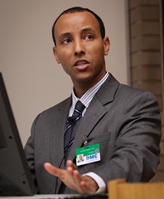
Wayne State University School of Medicine faculty member Teferi Mitiku, M.D., continues to serve as the Detroit spokesman for the Heart Rhythm Society's "Arrest the Risk" campaign, creating awareness for the cardiac event that claims a life every 90 seconds.
(Watch a video on sudden cardiac arrest here).
Dr. Mitiku, assistant professor of medicine in the Department of Internal Medicine's Division of Cardiology, appeared on WJBK-TV (Fox 2) and WWJ-AM (950) earlier this month to discuss the lack of awareness in the African-American community of sudden cardiac arrest, one of the leading causes of death in the United States each year. He also presented a grand rounds lecture on the topic at the School of Medicine's Scott Hall on May 28. Dr. Mitiku is an attending physician and cardiologist with the Wayne State University Physician Group's internal medicine services at the Detroit Medical Center's University Health Center in Detroit.
The average survival rate outside a hospital for sudden cardiac arrest in Detroit is 0.2 percent. The chance of survival doubles if hands-only cardiopulmonary resuscitation is performed within three minutes of the patient collapsing, he said.
"The goal of this campaign is to get people screened before they get 'arrested,'" Dr. Mitiku said.
Nearly 383,000 out-of-hospital sudden cardiac arrests occur annually, according to the American Heart Association, with 88 percent happening at home. Ninety-five percent of people who experience SCA die as a result, often because immediate treatment is not accessible, according to the Heart Rhythm Society.
"People need to get help immediately, and people shouldn't be afraid of (performing) CPR," said Brian O'Neil, M.D., chair of the School of Medicine's Department of Emergency Medicine, in a recent interview with WWJ-AM regarding National CPR Awareness Week and sudden cardiac arrest.
African-Americans are nearly twice as likely as Caucasians to experience sudden cardiac arrest at home, work or in another public location, with lower survival rates, the American Heart Association said in a 2011 fact sheet.
SCA is not a heart attack, and occurs abruptly and without warning when the heart suddenly and unexpectedly stops beating. The heart's electrical system is affected, preventing blood from being pumped to the rest of the body. The heart's electricity must be restored to survive, usually through electrical shock via a defibrillator.
A national survey released last October by the Heart Rhythm Society indicated "a significant lack of awareness by consumers and providers. Most providers didn't rank this as being a major risk to patients, especially African-Americans," Dr. O'Neil said. "It isn't apparent to patients that they are at risk."
Ninety percent of African-Americans surveyed said their doctor had never talked to them about sudden cardiac arrest. The Heart Rhythm Society, an international medical professional organization, working with the Association of Black Cardiologists, launched the Arrest the Risk campaign in October 2012 to reduce disparities in the treatment and prevention of sudden cardiac arrest among African-Americans by increasing the dialogue between patients and physicians.
The groups are working with health care providers and community leaders in Detroit and nine other cities with at-risk populations, including Atlanta; Chicago; Dallas; Baltimore; Washington, D.C.; Jackson, Miss.; Nashville, Tenn.; New Orleans and Oakland, Calif., to spotlight the campaign at the local level. Local cardiologists like Dr. Mitiku give talks at churches, community centers and health fairs, delivering awareness and prevention tips, answering personal heart health questions and providing actionable follow-up materials to nearly 1,500 at-risk individuals so far.
Risk factors for sudden cardiac arrest include a previous heart attack; a family history of sudden death, heart failure or massive attack; an abnormal heart rate or rhythm of unknown case, even while resting; an unusually rapid heart rate that comes and goes; unexplainable episodes of fainting; and a low ejection fraction (a measure to determine how well a heart pumps blood).
For more information on sudden cardiac arrest and the Arrest the Risk campaign, visit www.ArrestTheRisk.org.